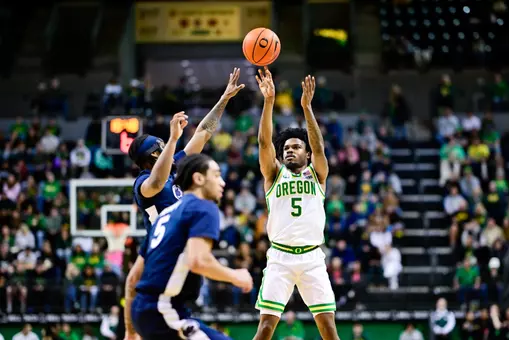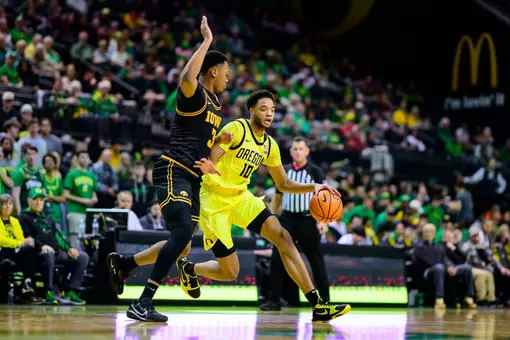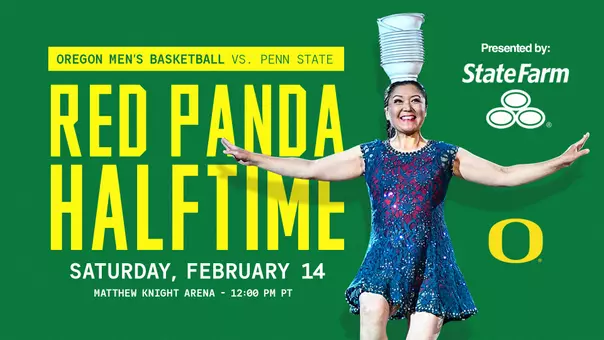
Photo by: Samuel Marshall
From Crossroads in Los Angeles, Ducks At Doorstep Of Sweet Sixteen
03/23/19 | Men's Basketball, @GoDucksMoseley
Oregon's season hit a low point in a road sweep at USC and UCLA, but the Ducks have won nine straight since, entering Sunday's second-round NCAA Tournament game with UC Irvine (6:40 p.m., TBS).
SAN JOSE, Calif. — About 350 miles separate the cities of Los Angeles and San Jose, the places where Oregon's men's basketball season reached its lowest depths and potentially its greatest heights.
On Sunday, the Ducks face UC Irvine in the SAP Pavilion (6:40 p.m, TBS), for a spot in the NCAA Tournament's Sweet Sixteen. The game will tip off one month and two days after the UO men hit the crossroads of their season, in a loss at USC on Feb. 21.
The Ducks scored just 49 points that day, their fewest in a Pac-12 game this season. They lost by 17, in a game beset by defensive breakdowns. The Ducks weren't communicating when the Trojans had the ball, and their frustration was bubbling over.
In the locker room after that loss, UO coach Dana Altman threw up his hands in frustration. The starting lineup was going to change two days later at UCLA, he told the Ducks; just what it would look like he wasn't sure — other than that it could include Francis Okoro, the blue-collar freshman post who had been the one player immune to finger-pointing.
Oregon ended up losing at UCLA, surrendering 62 points in the second half. Since then, the UO men are 9-0, fueled by better team chemistry, a resurgent Payton Pritchard and the nation's most relentless defensive pressure.
"Ever since, this team has kind of gone in a new direction," senior Paul White said Saturday, prior to Oregon's practice at the SAP Pavilion. "I think we've been a more cohesive group, and a more mature group. And it's really showing."
Friday's win over Wisconsin exemplified Oregon's new attitude. Altman leaned heavily on five players in the second half, reverting to a smaller lineup with Will Richardson in place of Okoro. That group blew the game open, turning a 25-25 halftime tie into a 72-54 Oregon win.
To watch the celebration in the postgame locker room, you couldn't tell that reserves Miles Norris, Victor Bailey Jr. and Ehab Amin combined to play just six second-half minutes.
"They haven't pouted; they haven't done anything that could bring this team down," White said. "That could be easy for some players; they were highly touted recruits too. But everyone has embraced everything."
Among the players whose minutes were limited in the second half was Amin. He came to Oregon last fall as a graduate transfer, and began the season in the starting lineup. Lately, he's settled into an energy role off the bench. And he couldn't be happier.
"When you start winning, it feels good and you want to keep doing what's helping you," Amin said. "We figured that out."
That's not to suggest playing off the bench has been easy to swallow. It's human nature for an athlete to want more playing time. True leadership is swallowing that desire for the sake of the team.
"Especially as a fifth-year, this is your last chance (to play a big role in college)," Amin said. "But it's also your last chance to make the tournament, or win a championship. You've got to do what you have to do for your team, and your coaches — and for yourself."
Oregon's cohesiveness has been most evident on the defensive end. Since allowing 62 in a single half at UCLA, the Ducks have allowed that many points in a full game just once during their winning streak, a 79-75 overtime Pac-12 semifinal victory over Arizona State. Now when there's a rare breakdown, the Ducks aren't looking for someone to blame. They're looking for a way to fix it.
"We all kind of bonded together at that time and realized we had to depend on each other, and we had to pick each other up," said sophomore post Kenny Wooten. "We weren't going to win games doing the same thing; that's kind of the definition of insanity. So we realized we had to change."
If there was an individual catalyst, it was Okoro. The big freshman "truly turned our team around," White said.
"Everybody was ready to buy into the team," Okoro said, shrugging off the credit. "We needed that one person to buy in, and everybody would. I was just like, I'm going to do what's right. And everybody else did the same."
At that point, losses had piled up so high, the Ducks were ready to embrace change. But also, Pritchard said, a roster with several high-profile freshman and a graduate transfer in Amin finally started to figure out what made each other tick, too.
"The team was just really split," Pritchard said. "There was definitely cliques. And now there's not really cliques. People love each other now — and that takes awhile. Some friendships don't happen right away."
For the Ducks this season, they happened just in the nick of time.
On Sunday, the Ducks face UC Irvine in the SAP Pavilion (6:40 p.m, TBS), for a spot in the NCAA Tournament's Sweet Sixteen. The game will tip off one month and two days after the UO men hit the crossroads of their season, in a loss at USC on Feb. 21.
The Ducks scored just 49 points that day, their fewest in a Pac-12 game this season. They lost by 17, in a game beset by defensive breakdowns. The Ducks weren't communicating when the Trojans had the ball, and their frustration was bubbling over.
In the locker room after that loss, UO coach Dana Altman threw up his hands in frustration. The starting lineup was going to change two days later at UCLA, he told the Ducks; just what it would look like he wasn't sure — other than that it could include Francis Okoro, the blue-collar freshman post who had been the one player immune to finger-pointing.
Oregon ended up losing at UCLA, surrendering 62 points in the second half. Since then, the UO men are 9-0, fueled by better team chemistry, a resurgent Payton Pritchard and the nation's most relentless defensive pressure.
"Ever since, this team has kind of gone in a new direction," senior Paul White said Saturday, prior to Oregon's practice at the SAP Pavilion. "I think we've been a more cohesive group, and a more mature group. And it's really showing."
Friday's win over Wisconsin exemplified Oregon's new attitude. Altman leaned heavily on five players in the second half, reverting to a smaller lineup with Will Richardson in place of Okoro. That group blew the game open, turning a 25-25 halftime tie into a 72-54 Oregon win.
To watch the celebration in the postgame locker room, you couldn't tell that reserves Miles Norris, Victor Bailey Jr. and Ehab Amin combined to play just six second-half minutes.
"They haven't pouted; they haven't done anything that could bring this team down," White said. "That could be easy for some players; they were highly touted recruits too. But everyone has embraced everything."
Among the players whose minutes were limited in the second half was Amin. He came to Oregon last fall as a graduate transfer, and began the season in the starting lineup. Lately, he's settled into an energy role off the bench. And he couldn't be happier.
"When you start winning, it feels good and you want to keep doing what's helping you," Amin said. "We figured that out."
That's not to suggest playing off the bench has been easy to swallow. It's human nature for an athlete to want more playing time. True leadership is swallowing that desire for the sake of the team.
"Especially as a fifth-year, this is your last chance (to play a big role in college)," Amin said. "But it's also your last chance to make the tournament, or win a championship. You've got to do what you have to do for your team, and your coaches — and for yourself."
Oregon's cohesiveness has been most evident on the defensive end. Since allowing 62 in a single half at UCLA, the Ducks have allowed that many points in a full game just once during their winning streak, a 79-75 overtime Pac-12 semifinal victory over Arizona State. Now when there's a rare breakdown, the Ducks aren't looking for someone to blame. They're looking for a way to fix it.
"We all kind of bonded together at that time and realized we had to depend on each other, and we had to pick each other up," said sophomore post Kenny Wooten. "We weren't going to win games doing the same thing; that's kind of the definition of insanity. So we realized we had to change."
If there was an individual catalyst, it was Okoro. The big freshman "truly turned our team around," White said.
"Everybody was ready to buy into the team," Okoro said, shrugging off the credit. "We needed that one person to buy in, and everybody would. I was just like, I'm going to do what's right. And everybody else did the same."
At that point, losses had piled up so high, the Ducks were ready to embrace change. But also, Pritchard said, a roster with several high-profile freshman and a graduate transfer in Amin finally started to figure out what made each other tick, too.
"The team was just really split," Pritchard said. "There was definitely cliques. And now there's not really cliques. People love each other now — and that takes awhile. Some friendships don't happen right away."
For the Ducks this season, they happened just in the nick of time.
Players Mentioned
Nate Bittle & Takai Simpkins | Postgame vs. Penn State
Saturday, February 14
Dana Altman | Postgame vs. Penn State
Saturday, February 14
Dana Altman: "A lot of new faces."
Wednesday, February 04
Dana Altman | Postgame vs. Iowa
Monday, February 02





















